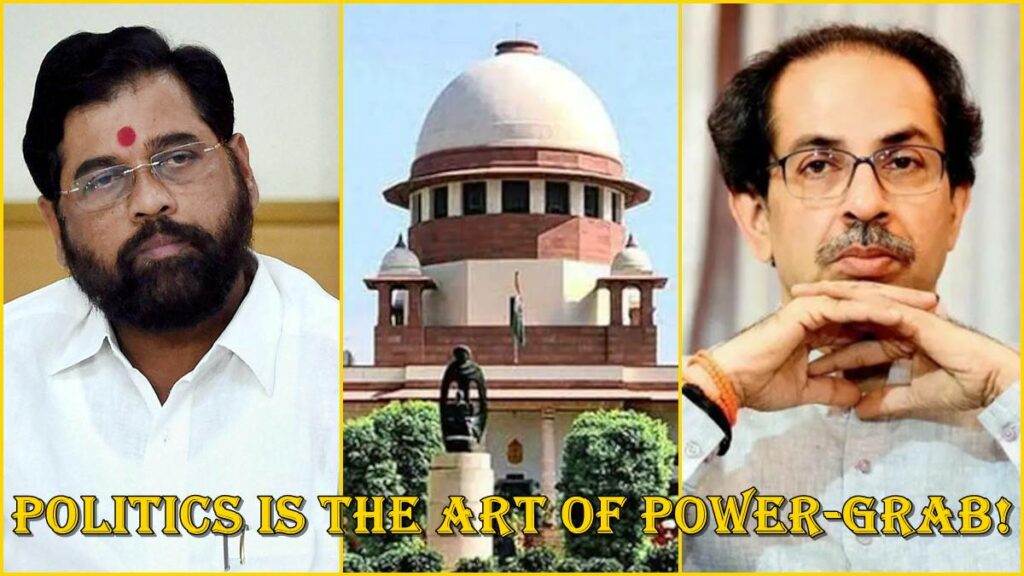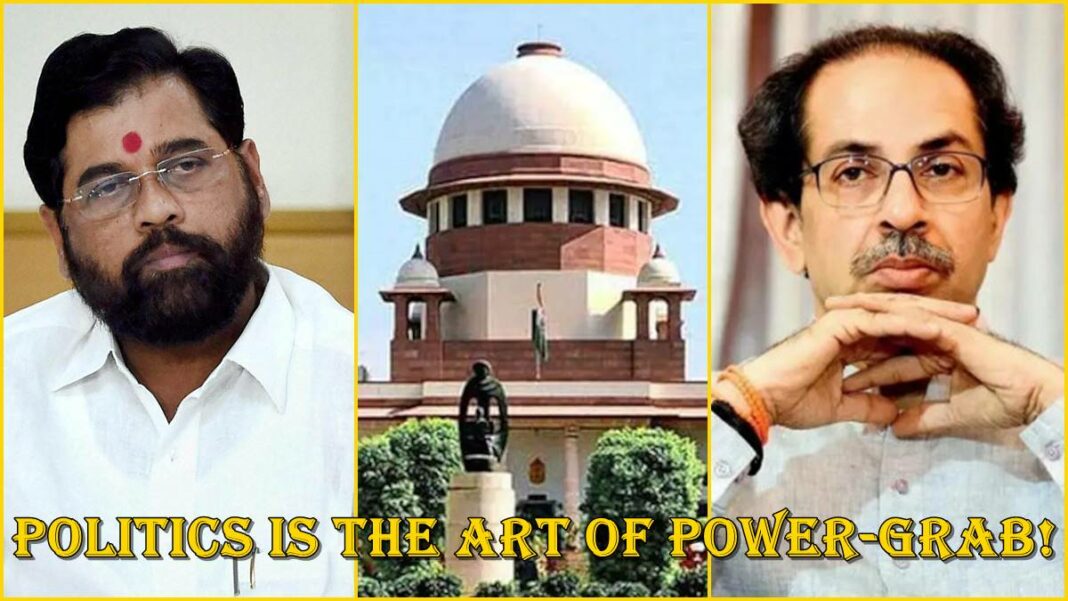
By Narasimhan VijayaraghavanSo the eagerly anticipated decision in Subhash Desai v. Principal Secretary, from the Supreme Court, dt.11th May,2023, is out. Eknath Shinde government, call it by any name continues. Despite the decision/direction of Governor to hold a floor test being held to be invalid, the failure of MVA government to face the vote, led to upholding of the order of Governor to invite Shinde to form the government. Udhav would ask Shinde to quit. Shinde would respond, “Supreme Court has upheld the invite to me”. What happens then? Nothing.
The only good development for Udhav Thackeray is that Eknath Shinde cannot claim to be head of the political party Shiv Sena, based on legislative majority. Election Commission has to take note of this finding from the constitution bench and decide afresh. And that dear reader,is already pending before the Supreme Court. Law and lawyers take over. With little or no impact on politicians who choose to do what they want to. And shall continue to. That is the beauty of interplay between politics, constitution and law!
Who needs to learn lessons?The politicians knew it all. It was law that was taken for a royal ride by them .The lesson is therefore meant for law,courts a.k.a. justices and We the People.Politics is all about power grab. The Anti-Defection Law in India is contained in the Tenth Schedule of the Constitution. It was passed in 1985 to address the issue of political defections, which were seen as a threat to the stability of the political system. On multiple occasions, the Supreme Court has been called upon to pronounce on the ‘legality’ of the power grab game. The present judgment is the latest. Not the last.
To wit Nani Palkhivala, a proud Maharashtrian, who was Indian first, the philosophy that politics is all about grabbing power and nothing else is no cynical view of the political process that has gained popularity in recent times.While there is more than a grain of truth to this view, it is an oversimplification of the complex factors that drive political behavior.
At its core, politics is about the distribution of power and resources within a society. It involves the use of institutions, processes, and systems to make decisions that affect the lives of individuals and groups. The pursuit of power is an inherent part of this process, as politicians seek to gain the authority and influence necessary to shape policy and achieve their goals, and now morphed to shamefully become the only factor that motivates political behavior.
Politics is about compromise and negotiation. In a democratic polity,political decisions must be made through a process of negotiation and compromise, as different interests and perspectives are taken into account. This requires politicians to engage in dialogue and build coalitions with others, in order to achieve their goals and advance their agendas. But our friendly Maharashtra politicians demonstrated that manipulation and skulduggery were critical part of the negotiating tools.
Let us not delude ourselves. Even the Supreme Court is a political institution. It is the final arbiter of the Constitution of India viz a political instrument. To understand politics, we must recognize the complexity and nuance of the political process, and the important role that it plays in shaping our world. To understand law and limits to its remit, we need to be aware that neither legislature nor judiciary can ‘legalize morality’. In the wake of a possible hung assembly in Karnataka, beware.
Morality is a term that is often associated with ethical behavior and principles. It is the belief system that governs an individual’s actions and decisions, and it is often shaped by cultural and societal values. In political circles, morality is an important factor that determines the behavior of politicians and their policies. However, the idea that morality can be legalized for politicians is flawed, as it goes against the very nature of morality and its subjective nature.
Morality is a personal and subjective concept that cannot be defined or enforced by law. It is based on individual beliefs, values, and principles, and it varies from person to person. What may be considered morally right by one person may be considered morally wrong by another. Therefore, the idea that morality can be legalized for politicians is impractical and unfeasible.And politicians know it too.
The role of politicians is to represent the interests of their constituents and uphold the laws of the land. While morality can influence their decision-making, it cannot be the sole basis for their actions. The law provides a framework for governing behavior and actions, but it cannot dictate what is morally right or wrong. Morality is a personal choice that cannot be imposed or enforced by external factors.
Furthermore, the idea of legalizing morality for politicians raises questions about who gets to define what is morally right or wrong. It opens the door for subjective interpretations and biases, which can lead to the misuse of power and authority. It is not the role of the government or any external entity to impose morality on individuals, as it goes against the principles of individual freedom and autonomy.
The notion that morality can be legalized for politicians is flawed and impractical. Politicians should be held accountable for their actions and decisions, but they should also be allowed to exercise their personal beliefs and values. It is important to strike a balance between personal beliefs and public responsibilities, and to ensure that politicians act in the best interests of their constituents and the society as a whole.And ‘power grab’ is, undoubtedly, a ‘public responsibility’ for ‘private interest’ of our politicians, in our experience.
The only certainty from this landmark verdict is, ‘No minority government facing a floor test would now resign. They will face the vote and get defeated to preserve the possibility of a constitutional court reviving it’, if the principles laid down warrant it. Other than this, substantive lessons held out by the apex court are for itself and those of us not politicians among We the People. Jai Hind!
( Writer is practicing advocate in the Madras High Court)
